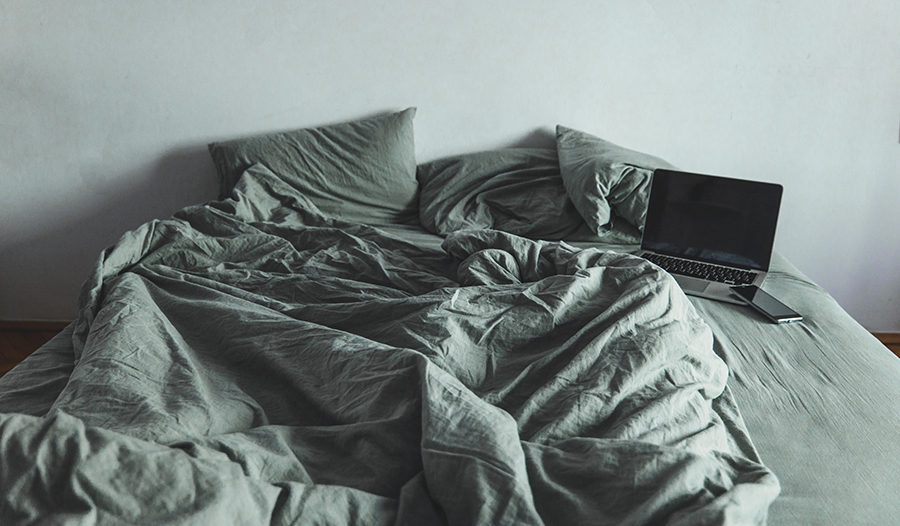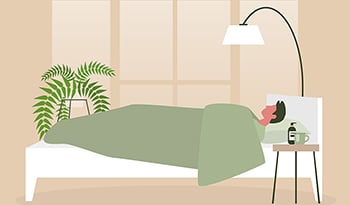“Evden Çalışma Uyku Vardiyası” ve Nasıl Düzeltilir

Evden çalışmak uyku düzeninizin değişmesine neden olabilir. Planlamadan önce aniden daha sonra uyanık kaldığınızı, daha fazla uyuduğunuzu veya tamamen uyanık olduğunuzu fark edebilirsiniz. Bir ofiste çalışmaktan evden çalışmaya geçtiğinizde meydana gelen programdaki değişimin geçerli nedenleri vardır. Neyse ki, uyku ritminizi sıfırlamanın ve iş günü boyunca üretken kalmanın sağlıklı, kanıta dayalı yolları vardır.
Evden Çalışmak Neden Uykuyu Etkiler?
Kesintiler ve Dağınık Verimlilik
Evden çalışırken, normalde dikkatinizi işten çeken günlük şeyler yüzünden kesintiye uğramanız daha olasıdır. Faturalar, çocuklar, ortaklar, alışveriş, çalışma saatleri içinde fiziksel olarak sizden ayrılan talepler artık çok yakın. Örneğin öğle yemeği veya su içmek için mutfağa giderken, adreslenmesi gereken postaları fark edebilirsiniz veya bir hane üyesi sizden yardım isteyebilir veya hatta sadece konuşmak isteyebilir.
Sonuç olarak, iş daha uzun sürer ve birkaç konsantre saatten ziyade gün boyunca kısa atışlarla gerçekleşir. Normal 8 saatlik programınız 9-5'e daha az ve daha çok şöyle görünmeye başlamış olabilir:
- 9:15 - 10:45
- 11:30 - 13:00
- 1:45 - 14:45
- 15:15- 16:15
- 18:15 - 19:00
- 8:45 - 22:45
Bunun tamamen ve tamamen iyi olduğu söylenmelidir. Dağınık ve yoğunlaştırılmış üretkenlik sadece farklı çalışma biçimleridir. Dağınık üretkenlik, ilişkileri zorlayabilecek aşırı katı sınırları korumak zorunda kalmadan esnek olmanıza ve gün boyunca ailenizi ve kişisel ihtiyaçlarınızı karşılamanıza olanak tanır.
Dağınık model altında çalışıyorsanız olması gereken şey, işe döndüğünüzde hızlı bir şekilde konsantre olmaya başlayabilmek için beyninizi eğitmeniz gerektiğidir. Sonunda masanıza oturduğunuzda derin bir nefes alarak, konsantre olmanız gerektiğinde devam eden belirli bir çalma listesine sahip olarak ve çalıştığınız evinizde ayrı bir alan koruyarak bunu başarabilirsiniz. Ayrıca, belirli bir bitki çayını yudumlamayı veya belirli bir uçucu yağı koklamayı içerebilecek işe geri dönmek için sağlıklı bir ritüel oluşturabilirsiniz. Bunun gibi alışkanlıklar yaratmak, beyninizi ihtiyaç duyduğunuzda hemen çalışma moduna geri dönmesi için eğitmenize yardımcı olacaktır. Aşağıda sayıldığında en üretken olmanız için daha fazla ipucu veriyorum.
Çalışma ve Uyku Alanı Örtüşmeye Başlıyor
Uyku hijyeni teorisinin zirvesi, uyuduğunuz yerde çalışmamanız veya oynamamanız gerektiğidir. Yatağınızı ve tercihen tüm yatak odasını sadece uyumak ve uyumak için kullanmak, beynimizin geceleri dinlenmek için uzanırken ne yapması gerektiği konusunda kafasının karışmasını önler.
Birçoğumuz evde ayrı bir ofis alanına sahip olacak kadar şanslı değiliz. Bu genellikle yatak odasının dışında çalıştığımız anlamına gelir. Bu sizin için doğru olsa bile, uyku hijyenini kendi yararınıza kullanmanın yolları var. Makalenin ilerleyen kısımlarında birkaç hack paylaşıyorum. Okumaya devam et!
Yalnız Zamanın İhtiyacı
Birlikte yaşıyorsanız, şaşırtıcı uyku değişimleri, evdeki mekandan ve zamandan kesintisiz olarak yararlanmanıza izin verebilir. Örneğin eşiniz uyurken ev ofisini kullanmak için erken uyanırsınız ve yorgun olduğunuzda günün sonunda projeleri bitirmek için geç saatlere kadar kalabilirler. Kaliteli uyku pahasına gelmediği sürece bu iyi ve hatta akıllıdır. Kasıtlı olarak yapılmazsa, evdeki herkes yatağa gittikten sonra uyanık kalırsınız ve projeniz gerçek bir yatma zamanı olmadan bitene kadar çalışırsınız. Bu, zamanla uyku yoksunluğuna yol açabilir, bu sağlık için bir sorundur çünkü uyku bağışıklık, iyileşme, biliş ve performansın çok önemli bir yönüdür. Kendinizin en iyi versiyonu olmak için yeterince uyumak zorundasınız.
Yatma zamanınızı ayarlamak ve gece boyunca daha sağlıklı uyumak istiyorsanız, işte bunu yapmanın bazı doğal yolları.
Uyku Programınızı İyileştirmenin 6 Yolu
1. Uyku Sığınağı Oluşturun
Uyku hijyeni, insanların optimal uykuyu teşvik etmek için değiştirebilecekleri çeşitli uygulamaların ve çevresel değişikliklerin adıdır. Örneğin karanlık, serin ve sessiz bir odaya sahip olmanın, insanların geceleri daha derin ve daha kaliteli uyku elde etmelerine yardımcı olduğu kanıtlanmıştır. Odanız aydınlıksa, ışığı engelleyen perdeler kullanarak ve yatmadan önce yapabileceğiniz elektronik cihazları kapatarak karartabilirsiniz. Bu mümkün değilse, dinlenirken gözlerinizi kapatmak için bir uyku maskesine yatırım yapın.
Uyuyacak en sessiz alana sahip değilseniz, uyku için kullanmak için kulak tıkacı kullanmaya yatırım yapmayı düşünün; NRR derecesi ne kadar yüksekse o kadar iyidir. Odanızı rahat bir sıcaklıkta tutun; Kötü uyuyorsanız, ortam sıcaklığını bir deney olarak birkaç derece daha sıcak veya daha soğuk değiştirmeyi deneyin ve yardımcı olup olmadığına dikkat edin.
2. İşin Çevresinde Sınırlar Oluşturun
Birçok kişi için iş günü saat 17:00 civarında bittiğinde sona erer. Üzerinde çalıştıkları şeyi bırakıp bir gün için eve giderler. Ama işiniz evinizde yaşıyorsa, bunu yapmak zor olabilir. Hala 8 saatlik iş günü yetkisi altında çalışıyorsanız, 9-5 arasındaki eski çalışma saatlerinizde atladığınız fazladan “zamanı” telafi etmek için geç saatlere kadar ayakta kalabilirsiniz. Bununla birlikte, kanıtlar, bunun görevleri yerine getirmenin en az etkili yolu olduğunu göstermektedir. Uzmanlar, gün boyunca harcadığınız saatleri izlemek yerine, gün için bir hedef listesi oluşturmanızı ve tamamlandıktan sonra bırakmanızı önerir. Pazartesi günleri üç toplantı ve iki rapor yaparsanız, 8 saate ulaşana kadar beklemek yerine, bunları evde yaptıktan sonra bırakın.
Ek olarak, ne olursa olsun işten vazgeçmek için kendinize bir zaman ayarlayın. İş yükünüze bağlı olarak 10:00, 20:00 veya 17:00 olabilir. Zaman ne olursa olsun, tutarlı bir şekilde ona bağlı kalmaya çalışın. Bu, vücudunuzun geceleri ne zaman dinlenmeye başlayacağını bilmesine yardımcı olacaktır.
3. Uyku ve Çalışma için Ayrı Alanlar Oluşturun
Yatak odanızda çalışmak zorunda kalırsanız, çalışma sırasında yatağınıza bakmamak veya yatağınızda oturmamak için masanızı yatağınızdan uzağa çevirin. Mümkünse yatağınızın masanıza bakmasına da izin vermeyin. Dinlenmeye çalışırken bitmemiş işlerle dolu bir masaya bakmak istemezsiniz.
Evden uzun süre çalışmayı planlıyorsanız, uyku ve çalışma alanlarınızı da yükseltmeyi gerçekten düşünün. Birkaç ekstra yastık, beyninizi artık yatak odanızda olmadığınızı düşünmesi için kandırmak için yatağınızı gün boyunca bir kanepe alanına dönüştürmenize yardımcı olabilir. Ayrıca, iş kağıtlarınızı gün boyunca kullanmayı bitirdiğinizde saklamak için bazı çekmecelere yatırım yapabilirsiniz, böylece gözden kaybolurlar. Gün boyunca odadaki aydınlatmayı gece yakma şeklinize göre değiştirmek başka bir seçenektir. Olasılıklar sonsuzdur ve ucuz olabilir. Onunla iyi eğlenceler. Hem iş hem de uyku önemlidir. Her ikisini de yapmak için güzel alanları hak ediyorsunuz.
4. Akşamdan Önce Egzersiz
Egzersizi günün erken saatlerine kaydırın. Kanıtlar, akşam yemeğinden sonra egzersiz yapmanın sizi gece geç saatlere kadar ayakta tutabilecek uyanıklığı teşvik eden nörokimyasallarda destek verebileceğini gösteriyor. Daha erken egzersiz yapmanın diğer yararı, size enerji vermenize ve gün boyunca odaklanmanızı artırmanıza yardımcı olmasıdır.
5. Bir Gece Rutini Oluşturun
İyi bir gece rutini, uykuya dalmak istemeden yaklaşık iki saat önce başlar. Amacınız sabah 6:00 'a kadar uyanmaksa, telefonunuzda saat 20:00 saatine hafif bir hatırlatma veya alarm ayarlayın, böylece saat 22:00 yatmadan önce dinlenmeye başlayabilirsiniz. Saat 20:00 'de beyninize yatma zamanının geldiğini bildirmek için elektronik cihazları bir kenara bırakmalı veya mavi ışığı engelleyen gözlük veya ekranlar takmalısınız.
Ardından, beyninize dinlenme zamanının geldiğini bildirmek için sıcaklık, yiyecek ve içeceklerin bir kombinasyonunu kullanın. Kas gerginliğini gevşetmek ve rahatlamayı teşvik etmek için ılık bir duş veya banyo yapın. Rahatlatıcı etkiyi arttırmak için banyoya veya duşa lavanta ve portakal gibi sakinleştirici kokular içeren banyo ürünlerini ekleyebilirsiniz. Daha sağlıklı uyumanıza yardımcı olmak için yatmadan önce protein, yağ ve düşük glisemik karbonhidratlarla dengelenmiş küçük bir atıştırmalık düşünün. Ayrıca doktorunuza beyninize sinyal vermek için yatmadan 30 dakika önce 1 mg melatonin almayı sorabilirsiniz.
Yatağa gitme süreci keyifli olmalı - tercihen dört gözle beklediğiniz bir şey. Bu, zamanı geldiğinde kolaylıkla yapmanıza yardımcı olacaktır.
6. Çalışırken Üretken Olmayı Taahhüt Edin
Yukarıdaki ipuçlarının etkili olması için, işe oturduğunuzda gerçekten oyunda olmanız gerekir. Beyninizi hızlı bir şekilde çalışma moduna (belirli bir çay, içecek veya koku ile) çekmek için mini bir ritüel oluşturma hakkındaki yukarıdaki tavsiyeleri unutmayın. Ayrıca, öğünlerinizi ve takviyelerinizi stratejik olarak zamanlayabilirsiniz, aksi takdirde dikkatiniz en çok dikkatiniz dağılmış olduğunda odaklanma yeteneğini size vermek için zamanlayabilirsiniz. Bunun güzel bir örneği, birçok kişinin iş günü boyunca bildirdiği 10:00-11:00 ve 15:00 - 16:00 çöküşüdür. Buna karşı koymak için, beyninizi beslemek için yakınınızda sağlıklı bir atıştırmalık bulundurun veya o sırada (daha sonra değil) B12 gibi uyarıcı vitaminler içeren takviyeler alın.
Umarım bu ipuçları evden sağlıklı ve mutlu bir şekilde çalışmanıza yardımcı olabilir. Her zaman olduğu gibi, daha fazla yardıma veya sadece sizin için özelleştirilmiş bir plana ihtiyacınız varsa doktorunuzla sohbet edin.
FERAGAT:SAĞLIK MERKEZİ tanı koymayı hedeflememektedir...
















































































 İçindekiler
İçindekiler
















